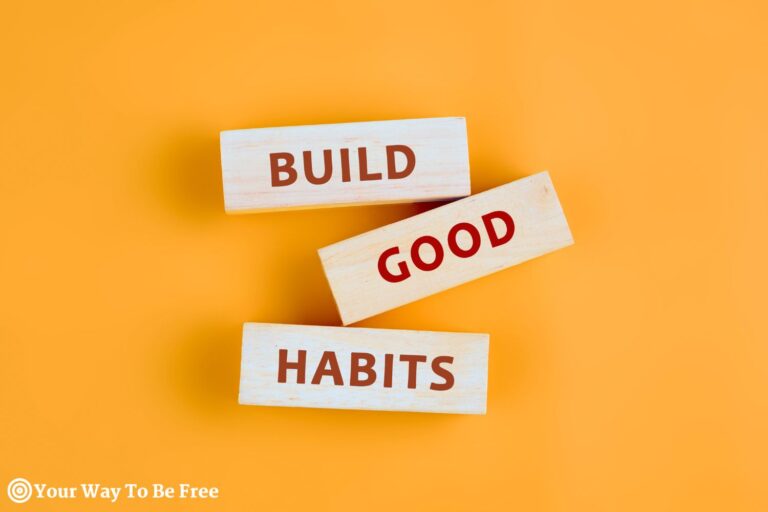Stress has woven itself into the very fabric of our daily lives, often leaving us feeling like we’re barely keeping our heads above water.
The relentless pace of modern living and the constant demands of work, family, and social obligations can significantly affect our mental and physical well-being. It’s easy to feel trapped in a cycle where relaxation seems like a fleeting dream rather than a tangible reality.
But amidst this chaos, there’s a beacon of hope, a powerful tool that can help you navigate these turbulent waters with grace and resilience: mindfulness. Imagine being able to pause, take a deep breath, and fully engage with the present moment, no matter how hectic your surroundings may be.
Mindfulness offers exactly that—a way to center yourself, reduce stress and cultivate a sense of inner peace. Mindfulness isn’t just a trendy buzzword; it’s a transformative practice that empowers you to take control of your mental landscape. By incorporating mindfulness into your daily routine, you can significantly reduce stress, enhance your focus, and improve your overall well-being.
In this article, we’ll explore the top five mindfulness practices that can help you manage stress effectively and lead a more balanced, fulfilling life.
More of a visual learner? Watch this video below and subscribe to our YouTube channel here!
The Detrimental Effects of Stress on Our Health
Stress is more than just a fleeting feeling of being overwhelmed; it can have profound effects on our mental and physical health. Chronic stress has been linked to a variety of mental health issues, including anxiety, depression and burnout.
It can impair cognitive functions such as memory, attention, and decision-making, making it harder to perform daily tasks and maintain healthy relationships. Physically, prolonged stress can weaken the immune system, increase blood pressure and contribute to other serious health conditions like heart disease.
The relentless pace of modern living often leaves us feeling trapped in a cycle where relaxation seems like a fleeting dream rather than a tangible reality. This constant state of stress not only affects our ability to function effectively but also diminishes our overall quality of life.
Related: The Best Ways to Unwind: Practical Tips for Effective Stress Relief
How Mindfulness Serves as a Powerful Tool Against Stress
In this challenging landscape, mindfulness emerges as a powerful ally. Mindfulness practices cultivate a heightened awareness of the present moment, enabling individuals to observe their thoughts and emotions without judgment. This non-reactive stance allows for better emotional regulation, reduces the impact of stressors and fosters a sense of calm and clarity.
Scientific studies have consistently shown that mindfulness can decrease levels of cortisol, the body’s primary stress hormone and improve symptoms of anxiety and depression. By incorporating mindfulness into your daily routine, you can take a transformative step towards a healthier, more balanced life.
Here’s why mindfulness is essential for reducing stress:
- Enhances Emotional Regulation: Mindfulness helps you become more aware of your emotions, allowing you to respond to stressors calmly rather than reacting impulsively.
- Improves Focus and Concentration: By training your mind to stay present, mindfulness reduces the tendency to dwell on past events or worry about the future.
- Promotes Physical Relaxation: Mindfulness practices often involve deep breathing and relaxation techniques that can lower heart rate and reduce muscle tension.
- Increases Resilience: Regular mindfulness practice builds mental resilience, making it easier to cope with life’s inevitable challenges.
- Boosts Overall Well-Being: Beyond stress reduction, mindfulness enhances overall happiness and satisfaction by fostering a deeper connection with yourself and your surroundings.
Top Five Mindfulness Practices to Reduce Stress
Embracing mindfulness doesn’t have to be complicated. Here are five effective practices that can help you manage stress and enhance your mental well-being:
1. Meditation
Meditation invites you to pause and center yourself amidst daily chaos. By focusing on a specific object, thought, or activity, meditation cultivates attention and awareness, empowering you to navigate life’s challenges with ease and resilience. This practice not only alleviates stress but also enriches your mental and emotional well-being.
Getting Started: Begin by finding a quiet space where you feel comfortable and won’t be disturbed. You can sit on a chair with your feet flat on the ground or lie down if that feels more relaxing. Close your eyes and bring your attention to your breath. Notice the sensation of air entering and leaving your nostrils or the gentle rise and fall of your chest with each inhale and exhale.
Staying Present: As you focus on your breathing, thoughts will naturally arise. Instead of trying to push them away, acknowledge their presence without judgment and gently guide your focus back to your breath. This non-reactive observation helps you develop a deeper awareness of your thought patterns and emotional responses.
Building the Habit: Start small by dedicating just five minutes each day to meditation. As you become more comfortable with the practice, gradually increase the duration to enhance its benefits. Consistency is key, regular meditation can significantly reduce stress, improve concentration, and foster a sense of overall well-being.
2. Journaling
Journaling provides a safe space to explore and process your thoughts and emotions. By writing down your feelings, you gain clarity, release pent-up stress, and better understand their sources. This practice not only reduces stress but also fosters a deeper connection with yourself, enhancing your mental well-being.
Getting Started: Select a quiet time and a comfortable spot where you won’t be interrupted. Whether it’s early in the morning with a cup of coffee or in the evening before bed, establish a routine that works for you. All you need is a notebook or a digital device, whatever feels most natural for your writing process.
Expressing Yourself: Begin by writing about your day, your feelings, or any thoughts that are weighing on your mind. Don’t worry about grammar or structure; this is your personal space to freely express yourself. Prompts like “Today I felt…”, “I am grateful for…”, or “One thing that stressed me out today was…” can help guide your writing. Allow your thoughts to flow without judgment or censorship.
Reflecting and Growing: As you continue journaling, you’ll start to notice patterns and recurring themes in your thoughts and emotions. This self-awareness is invaluable, it helps you identify what triggers your stress and how you typically respond to it. Over time, journaling can reveal insights that empower you to make positive changes and develop healthier coping mechanisms.
Building the Habit: Aim to write regularly, whether it’s daily or a few times a week. Even dedicating just five minutes to each session can make a significant difference. As journaling becomes a habitual practice, you’ll find it easier to navigate stressful moments with greater ease and resilience.
3. Mindful Breathing
Mindful breathing is one of the simplest yet most powerful mindfulness practices you can incorporate into your daily routine. By focusing on your breath, you activate your body’s relaxation response, lowering your heart rate and calming your nervous system. Over time, regular practice can improve your overall emotional regulation, increase your resilience to stress, and foster a deeper sense of inner peace.
Getting Started: Find a comfortable and quiet place where you can sit or lie down without interruptions. Close your eyes to minimize distractions and bring your focus inward. Take a moment to settle into your posture, ensuring that you feel relaxed yet alert.
Focusing on Your Breath: Begin by taking a deep breath in through your nose, allowing your abdomen to rise as your lungs fill with air. Hold the breath for a brief moment, then slowly exhale through your mouth, feeling your body release the tension with each out-breath. Continue to breathe naturally, bringing your attention to the sensation of your breath entering and leaving your body.
Staying Present: As you focus on your breathing, you may notice your mind wandering to various thoughts, worries, or plans. Instead of engaging with these distractions, gently acknowledge their presence and guide your attention back to your breath. This practice of returning to your breath whenever your mind wanders helps build mental discipline and enhances your ability to stay present.
Building the Habit: Start with just a few minutes of mindful breathing each day. Gradually increase the duration as you become more comfortable with the practice. Incorporate mindful breathing into your daily activities—take a few mindful breaths before starting your workday, during a break, or before going to bed. Consistency is key to experiencing the full benefits of this practice.
4. Body Scan
Body Scan is a gentle mindfulness practice that helps you tune into your body’s sensations, promoting relaxation and reducing stress. By systematically focusing on different parts of your body, you can become more aware of where you hold tension and learn to release it. Regularly practicing Body Scan can significantly reduce physical stress and promote mental clarity.
Getting Started: Find a quiet and comfortable place where you can lie down without being disturbed. Whether it’s your bedroom, a cozy corner in your living room, or a peaceful spot outdoors, ensure you’re in a relaxed position.
Step-by-Step Process: Begin by closing your eyes and taking a few deep breaths to settle in. Start by directing your attention to your toes, noticing any sensations—tingling, warmth, or tension. Slowly move your focus up to your feet, ankles, calves and so on, paying attention to each area without judgment. If you encounter tension, take a deep breath and imagine releasing it as you exhale.
Building the Habit: Incorporate Body Scan into your daily routine by dedicating just 5-10 minutes each day. Whether in the morning to start your day with clarity or in the evening to unwind before bed, consistency will enhance its benefits.
5. Mindful Movement
Mindful Movement blends physical activity with mindfulness, helping you connect deeply with your body and calm your mind. This practice encourages you to stay present with each movement. Regular mindful movement reduces stress, improves flexibility and strength, and fosters a sense of calm and balance in your daily life.
Getting Started: Choose an activity you enjoy, such as yoga, tai chi, walking, or stretching. Find a quiet place where you can move without distractions.
Engaging in Mindful Movement: As you move, pay attention to how your body feels. Notice the sensation of your feet touching the ground, the rhythm of your breath and the flow of your movements. Move slowly and deliberately, letting go of distractions.
Building the Habit: Incorporate mindful movement into your daily routine by setting aside 10-15 minutes each day. Whether it’s a morning yoga session, a mindful walk during lunch breaks, or gentle stretching in the evening, consistency will enhance its benefits.
Tips for Incorporating Mindfulness into Your Daily Life
Integrating mindfulness practices into your daily routine doesn’t have to be daunting. Here are some practical tips to help you make mindfulness a consistent part of your life:
- Start Small: Begin with just a few minutes each day and gradually increase the duration as you become more comfortable.
- Set Reminders: Use alarms or sticky notes to remind yourself to practice mindfulness throughout the day.
- Create a Dedicated Space: Designate a quiet area in your home for your mindfulness practices to help signal to your mind that it’s time to relax and focus.
- Be Consistent: Try to practice mindfulness at the same time each day to build a routine.
- Be Patient: Mindfulness is a skill that takes time to develop. Be patient with yourself and acknowledge your progress, no matter how small.
- Combine Practices: Mix different mindfulness techniques to keep your routine varied and engaging.
- Stay Open-Minded: Explore new mindfulness practices and find what works best for you. Everyone’s journey with mindfulness is unique.
Conclusion: Embrace Mindfulness for a Calmer, Balanced Life
Stress is an inevitable part of life, but our response to it can make all the difference.
Mindfulness offers simple yet powerful practices to manage stress effectively and enhance mental clarity. By integrating meditation, journaling, mindful breathing, body scans and mindful movement into your daily routine, you cultivate a more balanced and resilient mindset.
Remember, mindfulness is a journey of small, consistent steps. Be patient with yourself and celebrate each progress milestone. These practices not only reduce stress but also deepen your connection with yourself and your surroundings, leading to a more peaceful and fulfilling life.
Start today by choosing one mindfulness practice that resonates with you, and gradually build upon it. Embrace mindfulness and take control of your stress, paving the way for a healthier, happier you.







